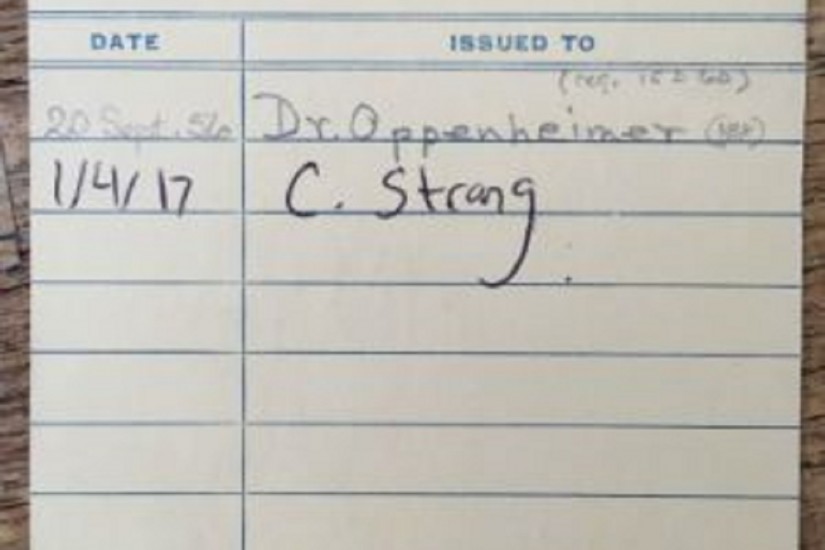This card connects one Institute to another: issued by the library of the Institute for Advanced Study (IAS) in Princeton, N.J., it features a book published by the Institute of Early American History and Culture, Brooke Hindle’s 1956 volume The Pursuit of Science in Revolutionary America, 1735–1789. It’s not the first title we ever published (that honor belongs to Louis B. Wright’s 1947 edition of Robert Beverley’s The History and Present State of Virginia), but it’s among the earliest (coming in at something like no. 16 on the list). The transatlantic historian in me longs to situate both institutions and their scholarly missions and output within the era’s Cold War context, but I’ll refrain for now and just point out that this old-fashioned library card bridges the disciplines of history and physics; it unites the humanities with the hard sciences.
Even more intriguingly, this unassuming document links an Institute book to a Cold War giant. Cameron was the Martin L. and Sarah F. Leibowitz Member at the IAS when he checked out Hindle’s The Pursuit of Science and discovered that he was in select company when it came to IAS readers of this book. As he put it in his email, “Before me, this copy had only one reader, but he’s pretty impressive.” J. Robert Oppenheimer—Presidential Medal for Merit recipient, chairman of the Atomic Energy Commission, professor of physics at the University of California, Berkeley, and the California Institute of Technology, director of the Los Alamos National Laboratory during World War II, and finally director of the IAS when he checked out Hindle’s book—was impressive indeed, an intellectual luminary and one of America’s most influential scientists, the “father of the atomic bomb” who later came to express ambivalence about his creation.[1]
Cameron’s snapshot piqued my curiosity (and not just because I’m a regular listener of the Department of Energy’s podcast “Direct Current” and loved its deep-dive episodes into the Manhattan Project last year). I knew why Cameron would read Hindle’s account of early American science; he was completing a manuscript on the subject, after all. Cameron’s forthcoming book takes American scientific thought and discoveries away from the learned societies, museums, and teaching halls of the Northeast (i.e., Hindle’s subjects in The Pursuit of Science) and puts the production of knowledge about the natural world in the context of competing empires and an expanding republic in the Gulf South instead.
